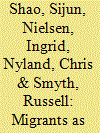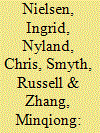| Srl | Item |
| 1 |
ID:
076886


|
|
|
|
|
| Publication |
2007.
|
| Summary/Abstract |
The problem of a shortage of migrant labor is a new development in China's coastal provinces. We discuss the reasons for this emerging phenomenon using a conceptual framework that extends the traditional Lewis dualistic labor market model to incorporate a migrant labor market. We emphasize that migrant labor shortage in China not only reflects a declining wage gap between what peasants receive and what migrants can earn in the cities, but also the institutional legacies of the planning era such as the hukou (household registration) system which discriminates against migrants vis-a-vis urban residents in terms of access to social insurance and other social services. We proceed to draw on a unique survey of migrants and urban residents collected in Jiangsu to show that migrants receive lower incomes, and they have poorer access to social insurance than those with an urban registration in China's cities. Our findings have important implications for the alleviation of the migrant labor shortage problem
|
|
|
|
|
|
|
|
|
|
|
|
|
|
|
|
| 2 |
ID:
076899


|
|
|
|
|
| Publication |
2007.
|
| Summary/Abstract |
In 2001 China ratified the International Covenant on Economic, Social and Cultural Rights. By so doing the national government became legally bound, "to the maximum of its available resources", to achieve "progressively" full realization of the rights specified in the Covenant. Included amongst these entitlements is the "right of everyone to social security, including social insurance". This paper uses data from Jiangsu to examine the extent to which urbanites agree that previously disenfranchised migrants have the same right to social insurance as the urban population. Many urbanites fear that their existing entitlements to social protection will be diluted if social insurance coverage is extended to include new populations. Accordingly, state agencies and the media have sought to promote acceptance of a more positive view of migrant workers than has traditionally prevailed within towns and cities. We find that younger urban residents, urban residents who already have social insurance and urban residents working in the state-owned sector are more likely to agree that migrants have the same right to social insurance as the urban population.
|
|
|
|
|
|
|
|
|
|
|
|
|
|
|
|
| 3 |
ID:
109853


|
|
|
|
|
| Publication |
2012.
|
| Summary/Abstract |
This study investigates personal wellbeing among a sample of ethnic Koreans in China's Northeast using the eight-item Personal Wellbeing Index (PWI). The PWI demonstrated good psychometric properties, consistent with previous studies. The data revealed a moderate level of personal wellbeing (PWI score = 70.3) and the results supported the Theory of Subjective Wellbeing Homeostasis, suggesting that strong external and internal buffers protect the HPM for ethnic Koreans, despite the onslaught of marketisation and urbanisation in China that are threatening to undermine Koreans' sense of ethnic identity. The predictors of personal wellbeing were found to be age (with a nonlinear relationship), education, gender, income, marital status and the city in which the individual lives.
|
|
|
|
|
|
|
|
|
|
|
|
|
|
|
|